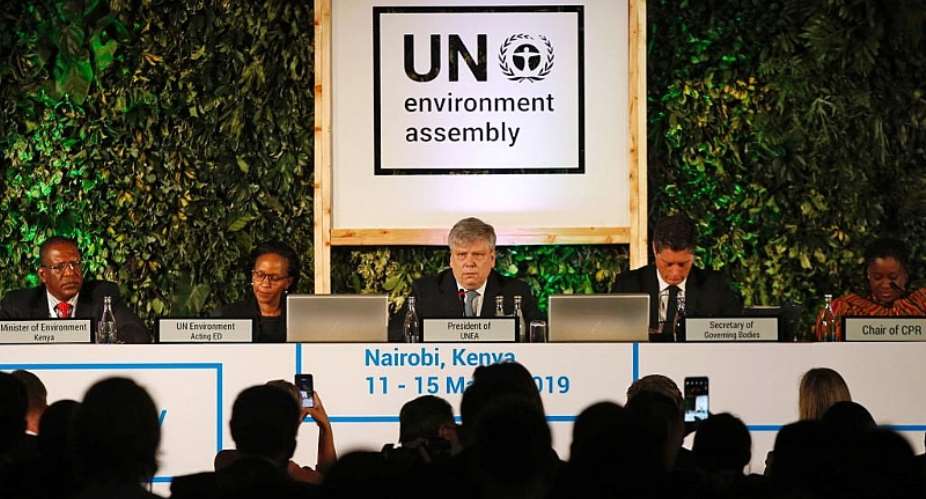The United Nations has urged world leaders meeting in Nairobi for the body's fourth environment assembly to take concrete action to curb food and plastic waste, amid damning reports highlighting the world's reckless consumption.
A new report released on Wednesday blames environmental damage for a quarter of all deaths around the world.
The paradox is that "while hundreds of millions of people go hungry every day, we're wasting 40 percent of the world's food resources every year," says Satya Tripathi, Assistant Secretary General to the United Nations Environment Programme (UNEP).
Stopping food waste is among the top priorities of the five-day UN Environment Assembly that kicked off on 11 March and runs through to the 15th. So too, is tackling the crisis of plastic pollution in our oceans.
This year's high-level environmental forum boasts its largest gathering , with prominent leaders, including the presidents of France and Kenya, Emmanuel Macron and Uhuru Kenyatta, expected to attend to add clout to the process.
"There's a lot of interest and I would say that this mainly comes from the reason that we are at a critical time in the Earth's history," Tripathi told RFI.
"If we don't act, we will have to pay a heavy price not just as humans but every other species," he said, echoing similar comments made by the acting UN environment chief Joyce Msuya ahead of the Nairobi meeting.
'Throw-away culture'
Msuya said last week the world needed to "transform the way our economies work... break the link between growth and increased resource use, and end our throwaway culture."
Tripathi agrees. "There is a highly regressive arrangement in place and we...need to reverse that and ensure effective utilisation of everything we grow."
Starting with cutting back on plastic. "Marine litter and pollution from single-use plastic" is piling up in landfills or ocean beds, wreaking havoc on the environment, he warns.
One briefing on the eve of the summit said the cost of ecosystems loss through agriculture, deforestation and pollution was as much as $20 trillion (17.7 trillion euros) since 1993.
"There is a lot at stake, there is a lot at play and we are expecting and hoping for the best results," insists Tripathi.
"A resolution is likely to be adopted that deals with chemicals and waste issues and also the development of a new global policy beyond 2020," says Achim Halpaap, who led a study by 400 scientists into chemical use.
'No plan B'
In his second Global Chemicals Outlook released in Nairobi on Monday, he highlighted the "significant growth in the chemicals industry," and predicted that sales of chemicals such as plastics , pesticides and cosmetics would "double again by 2030," posing a threat to people's health and the environment.
However, Halpaap remains optimistic. "We do have some momentum of countries now developing big industrial chemicals legislation," he says referring to OECD countries such as France, and hopes his report will encourage other countries with weaker jurisdictions to also effectively manage and dispose of their chemicals.
As for the UN's Tripathi, he is banking on a "clear road map" to emerge from stakeholders by the time the conference ends on Friday.
The day before that crucial deal, France's Macron along with Kenya's Kenyatta will have chaired the 'One Planet Summit' alongside the UN Environment Assembly to encourage member states to implement stiff climate policies.
"These things are all linked: climate, the environment, waste," one delegate told AFP news agency.
"We have passed the time where we could afford to go wrong, that is not an option anymore," says Tripathi. "There is no planet B so there can be no plan B. We have to succeed."





 We’ll establish Minerals Development Bank to support mining industry — Bawumia
We’ll establish Minerals Development Bank to support mining industry — Bawumia
 Minerals Commission, EPA will be decentralized to all mining districts if electe...
Minerals Commission, EPA will be decentralized to all mining districts if electe...
 Tax officers will not sit in your shops when I become president – Bawumia assure...
Tax officers will not sit in your shops when I become president – Bawumia assure...
 Register to vote to be part of the change we all want – Mahama urges non-registe...
Register to vote to be part of the change we all want – Mahama urges non-registe...
 Recently dismissed Weija-Gbawe MCE dead
Recently dismissed Weija-Gbawe MCE dead
 A/R: We’ll engage people to catch stray cattle to protect trees – Simon Osei-Men...
A/R: We’ll engage people to catch stray cattle to protect trees – Simon Osei-Men...
 Kumasi traders threaten to campaign against NPP over abandoned markets
Kumasi traders threaten to campaign against NPP over abandoned markets
 Bawumia to tour Bono and Ahafo regions
Bawumia to tour Bono and Ahafo regions
 Fire destroy structures at Saban Park in Chorkor
Fire destroy structures at Saban Park in Chorkor
 Military-ruled Chad votes for president in bloody transition
Military-ruled Chad votes for president in bloody transition
